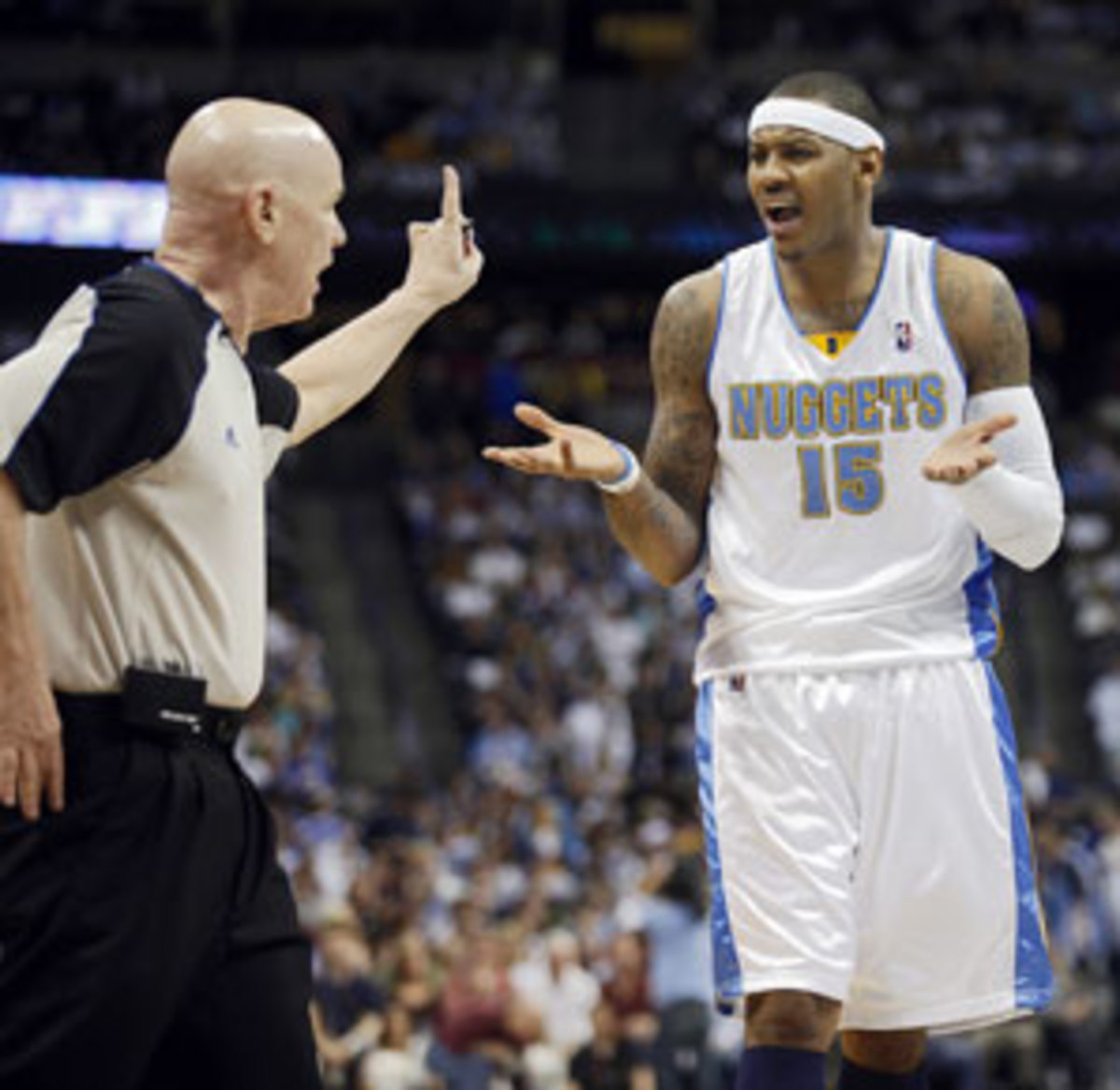Anthony's size, physicality make officials' jobs tougher than usual
DENVER -- Carmelo Anthony hadn't even crossed the three-point line when he first felt the contact. It was early in the second quarter of Monday's game against Utah and Anthony was drifting toward the paint, looking to position himself on the left block. Before he could get there -- or anywhere close, for that matter -- he was met by Jazz forward C.J. Miles, who leveled his shoulder into the chest of the Nuggets' star and gradually lowered it to the point where he was pushing Anthony backward. It was a lineman drill, and Anthony was the sled. A smiling Anthony cast an exasperated glance over at referee Ken Mauer, who looked back and allowed the play to continue.
Officiating Anthony has become one of the more difficult tasks for NBA referees. At 6-foot-8, 230 pounds, he is significantly stronger than most everyone at his position. He combines that strength with a relentless attacking style of play that leads to some kind of contact on most of his offensive possessions.
"It's in my nature to love contact," Anthony said. "The way I play, I like to get to the hole and I'll do whatever it takes to get there. I like going about it the hard way. I love to get thrown on the floor, pushed around. It's fun. The game is a physical game. I want to go out there and play physical."
But Anthony's style is less effective when the whistles aren't blowing. And while he gets his fair share of free-throw opportunities -- he was fifth in the league in attempts (8.9) during the regular season -- a case can be made that he deserves to go more, particularly in the postseason when games get more physical, as it has in the Nuggets' first-round series with the Jazz.
"He's always getting fouled," Nuggets point guard Chauncey Billups said. "But he's so strong it might not look like he's getting hit. The same call you give to a guy who is 210 [pounds] is the same call he should get. It should be no different."
The NBA's own rules support Anthony. Last year, the league launched a video rulebook, an online tool for reporters and fans to better understand foul calls. Under the category "impeding progress," it says that "a defensive player may not dislodge, reroute or impede an offensive player's progress" and provides several examples of a foul. Each example, it's fair to say, is a love tap compared to the contact Anthony absorbs trying to establish position.
"It's obvious," Anthony said. "It's blatant, everybody can see it. But that's basketball. [Utah] has got to do what they got to do to try and stop me."
Indeed, the Jazz have made no secret about their need to play physical with Anthony. They have been counseled all week by Matt Harpring, the former Jazz player turned broadcaster who was known for his physical defense. Harpring has stressed the importance of keeping Anthony off his sweet spot ("a couple feet off the block," he said) and wearing him down during the first three quarters.
"You have to push him 2 or 3 feet off of his spot," Harpring said. "He can be a bully. You have to bang with him and be physical all game. He gets into a rhythm, it's over. You have to get into him when he crosses half court."
To be fair, Anthony doesn't do much to help his own cause. When Kobe Bryant gets bumped too hard, he reacts demonstratively to get the referees' attention. Often, it works. Anthony said he is not interested in that type of tactic.
"I don't know how to do that," he said. "It's not in my nature. I don't know how to play like that. I don't really know what Kobe does out there."
Anthony has done little to cultivate relationships with officials, either. The Nuggets have a well-earned reputation for physical play, but they also rank among the league's biggest complainers. Opposing coaches say diplomacy is a foreign concept to most Nuggets players, Anthony included, and while a civil relationship with officials isn't a requirement -- "A foul is a foul," Billups said -- the human factor can't be overlooked.
"You just can't yell at [referees] all the time and expect to get calls," a Western Conference assistant coach said. "You think Rasheed Wallace gets the same calls as Jason Kidd?"
Added Denver interim coach Adrian Dantley: "Maybe he should 'play the game' [with officials]. I don't know. If you want to get a lot of calls, you have to do it. When I played, I might have gotten hammered, but I didn't say anything to the refs. You are not going to win the battle with the refs."
Anthony said he has tried to have more constructive discussions with officials. During Game 2, Anthony sought out more explanations for the lack of calls rather than complain about them. But the more he gets whacked and the less the whistle blows, the more irritated he becomes.
"It gets frustrating sometimes," Anthony said. "Some officials I talk to, they tell me I'm a difficult guy to officiate. But a foul is a foul."






